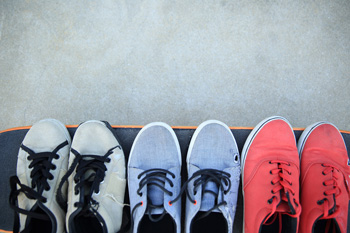 Improper shoe fitting can lead to many problems such as bunions, corns, and hammertoe. ill-fitting shoes can also lead to muscular imbalances in the body, which can eventually lead to hip and knee injuries. A perfectly fitting shoe should not have any excess material that may interfere with the foot’s natural motion. Many runners tend to wear shoes that are too small for their feet. If you are looking to purchase a new pair of shoes, be aware of the fact that your foot is at its widest at the toes, even though many shoes are not. You should also be mindful of the fact that your foot will spread up to half an inch in length when you are running. If you are experiencing problems with your feet due to poorly fitting shoes, you may want to schedule an appointment with your podiatrist.
Improper shoe fitting can lead to many problems such as bunions, corns, and hammertoe. ill-fitting shoes can also lead to muscular imbalances in the body, which can eventually lead to hip and knee injuries. A perfectly fitting shoe should not have any excess material that may interfere with the foot’s natural motion. Many runners tend to wear shoes that are too small for their feet. If you are looking to purchase a new pair of shoes, be aware of the fact that your foot is at its widest at the toes, even though many shoes are not. You should also be mindful of the fact that your foot will spread up to half an inch in length when you are running. If you are experiencing problems with your feet due to poorly fitting shoes, you may want to schedule an appointment with your podiatrist.
It is important to find shoes that fit you properly in order to avoid a variety of different foot problems. For more information about treatment, contact Dr. Lubrina Bryant from District Podiatry, PLLC. Our doctor will treat your foot and ankle needs.
Proper Shoe Fitting
Shoes have many different functions. They cushion our body weight, protect our feet, and allow us to safely play sports. You should always make sure that the shoes you wear fit you properly in order to avoid injuries and deformities such as: bunions, corns, calluses, hammertoes, plantar fasciitis, stress fractures, and more. It is important to note that although a certain pair of shoes might be a great fit for someone else, that doesn’t mean they will be a great fit for you. This is why you should always try on shoes before buying them to make sure they are worth the investment. Typically, shoes need to be replaced ever six months to one year of regular use.
Tips for Proper Shoe Fitting
The shoes you buy should always feel as good as they look. Shoes that fit properly will last longer, feel better, and improve your way of life each day.
If you have any questions, please feel free to contact our office located in Washington, D.C . We offer the newest diagnostic and treatment technologies for all your foot care needs.